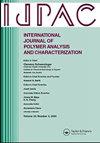Eliciting impact of nano-clay reinforcement and processing schemes on polyurethane chain dynamics by gold sputtering patterns (GSPs)
IF 1.7
4区 工程技术
Q4 POLYMER SCIENCE
International Journal of Polymer Analysis and Characterization
Pub Date : 2023-08-18
DOI:10.1080/1023666X.2023.2255024
引用次数: 0
Abstract
This article narrates how processing “bias” affects polymer chain dynamics due to variable 2D-nanofiller interfaces. Importance of this biasing can be assessed by the significant improvement in thermal and mechanical properties we have recently published for polyurethane-2D clay nanocomposite coatings. We intricately look at the nanoscale structure and subsequent interface formation between 2D clay and PU chains to understand the changes in morphology. Polyurethane (PU) chain dynamics was observed through the gold (Au) sputtered patterns in field emission electron microscopy (FESEM) images. These were fitted with circles and our findings confirm the presence of an attractive interface between PU and 2D nanoclay. Circle fitting elicits important data like the critical area ( ) and critical relative frequency ( ) which are used to evaluate the polymer chain dynamics and morphology. We find that is related to circularity, and reinforcing nanoclay to the PU matrix enhances by 4.6% and 6.9% with simultaneous use of ultrasonic bath and high shear homogenizer. This is further correlated with the already established methods of small angle X-Ray scattering (SAXS) and Fourier transform infrared (FTIR) spectroscopy to generate a fresh perspective on interfacial interactions in PU-2D clay nanocomposites.
利用金溅射模式(GSPs)研究纳米粘土增强和加工方案对聚氨酯链动力学的影响
摘要本文叙述了由于二维纳米填料界面的变化,加工“偏差”如何影响聚合物链动力学。这种偏倚的重要性可以通过我们最近发表的聚氨酯- 2d粘土纳米复合涂层在热性能和机械性能方面的显著改善来评估。我们错综复杂地观察了二维粘土和聚氨酯链之间的纳米级结构和随后的界面形成,以了解形态的变化。通过场发射电子显微镜(FESEM)图像中的金(Au)溅射模式观察了聚氨酯(PU)链动力学。我们的发现证实了PU和2D纳米粘土之间存在一个吸引界面。圆拟合得到的重要数据,如临界面积(Ac)和临界相对频率(fc),用于评估聚合物链动力学和形态。研究发现,纤维纤维含量与圆度有关,在超声浴和高剪切均质机同时使用的情况下,纳米粘土对PU基体的增强可使纤维纤维含量提高4.6%和6.9%。这进一步与已经建立的小角x射线散射(SAXS)和傅里叶变换红外(FTIR)光谱方法相关联,以产生对PU-2D粘土纳米复合材料中界面相互作用的新视角。圆拟合处理聚氨酯(PU)纳米复合材料FESEM图像。与裸PU(上图)相比,可以清楚地观察到纳米粘土(下图)表面PU的金溅射模式(GSPs)的差异。采用3种工艺方案制备了wt% C30B-PU纳米复合涂层。FESEM图像显示了不同处理样品的金溅射图案。gsp的圆拟合分析有助于理解聚合物纳米填料界面。聚合物链在二维纳米填料内部和周围的生长构象为聚合物链动力学提供了新的视角。关键词:链迁移率聚合物构像吸引界面组织fesem相分离度(DPS)金溅射图案(GSPs)圆形致谢作者感谢科思特罗(印度)私人有限公司免费为我们提供必要的材料。披露声明作者未报告潜在的利益冲突。数据可得性声明支持本研究结果的数据可根据通讯作者的合理要求获得。我们感谢SAP (UGC,新德里)、PURSE (DST,新德里)和TEQIP-III对SSBUICET博士的贡献。我们感谢DST-UT (S&T&RE/RP/147/Sanc/09/2017/1123-1129)和DRDO (DMSDE Kanpur) (TR/0569/CARS-130,日期为2021年12月16日)提供的经济援助。我们收到了来自英国诺丁汉特伦特大学(NTU)的科技合作资助。
本文章由计算机程序翻译,如有差异,请以英文原文为准。
求助全文
约1分钟内获得全文
求助全文
来源期刊
CiteScore
3.50
自引率
5.30%
发文量
37
审稿时长
1.6 months
期刊介绍:
The scope of the journal is to publish original contributions and reviews on studies, methodologies, instrumentation, and applications involving the analysis and characterization of polymers and polymeric-based materials, including synthetic polymers, blends, composites, fibers, coatings, supramolecular structures, polysaccharides, and biopolymers. The Journal will accept papers and review articles on the following topics and research areas involving fundamental and applied studies of polymer analysis and characterization:
Characterization and analysis of new and existing polymers and polymeric-based materials.
Design and evaluation of analytical instrumentation and physical testing equipment.
Determination of molecular weight, size, conformation, branching, cross-linking, chemical structure, and sequence distribution.
Using separation, spectroscopic, and scattering techniques.
Surface characterization of polymeric materials.
Measurement of solution and bulk properties and behavior of polymers.
Studies involving structure-property-processing relationships, and polymer aging.
Analysis of oligomeric materials.
Analysis of polymer additives and decomposition products.

 求助内容:
求助内容: 应助结果提醒方式:
应助结果提醒方式:


